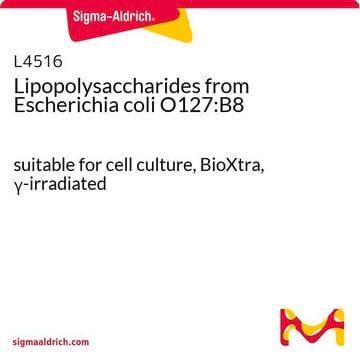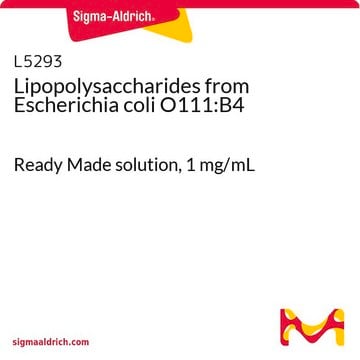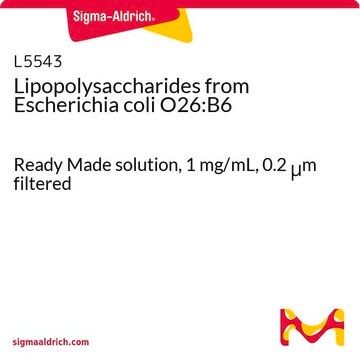L4641
Lipopolysaccharides from Salmonella enterica serotype minnesota
γ-irradiated, BioXtra, suitable for cell culture
Synonym(s):
LPS
Sign Into View Organizational & Contract Pricing
All Photos(1)
About This Item
Recommended Products
biological source
Salmonella enterica (Serotype minnesota)
sterility
γ-irradiated
product line
BioXtra
form
lyophilized powder
purified by
gel-filtration chromatography
technique(s)
cell culture | mammalian: suitable
impurities
<1% Protein (Lowry)
storage temp.
2-8°C
Looking for similar products? Visit Product Comparison Guide
General description
Lipopolysaccharides (LPSs) are characteristic components of the cell wall of Gram-negative bacteria. LPS and its lipid A moiety stimulate cells of the innate immune system by the Toll-like receptor 4 (TLR4), a member of the Toll-like receptor protein family, which recognizes common pathogen-associated molecular-patterns (PAMPs).
Application
Lipopolysaccharides from Salmonella enterica serotype Minnesota are used in cell culture and cell binding applications. LPS was used to elicit the activation of NF-κB pathway in human intestinal epithelial cells and mouse dendritic cells. It was used to study the immune responses following autologous blood donation.
Biochem/physiol Actions
Lipopolysaccharides (LPSs) are characteristic components of the cell wall of Gram-negative bacteria. LPS and its lipid A moiety stimulate cells of the innate immune system by the Toll-like receptor 4 (TLR4), a member of the Toll-like receptor protein family, which recognizes common pathogen-associated molecular-patterns (PAMPs).
Other Notes
To gain a comprehensive understanding of our extensive range of Lipopolysaccharides for your research, we encourage you to visit our Carbohydrates Category page.
related product
Product No.
Description
Pricing
Storage Class Code
13 - Non Combustible Solids
WGK
WGK 3
Flash Point(F)
Not applicable
Flash Point(C)
Not applicable
Personal Protective Equipment
dust mask type N95 (US), Eyeshields, Gloves
Certificates of Analysis (COA)
Search for Certificates of Analysis (COA) by entering the products Lot/Batch Number. Lot and Batch Numbers can be found on a product’s label following the words ‘Lot’ or ‘Batch’.
Already Own This Product?
Find documentation for the products that you have recently purchased in the Document Library.
Customers Also Viewed
R Karger et al.
Transfusion medicine (Oxford, England), 17(1), 45-53 (2007-02-03)
Preoperative autologous blood donation (PABD) has been shown to decrease natural killer (NK) cell function in cancer patients, raising concerns about an increased cancer recurrence risk owing to PABD. It is unclear whether PABD leads to other immunomodulatory effects that
Zsolt Czimmerer et al.
Immunity, 48(1), 75-90 (2018-01-19)
The molecular basis of signal-dependent transcriptional activation has been extensively studied in macrophage polarization, but our understanding remains limited regarding the molecular determinants of repression. Here we show that IL-4-activated STAT6 transcription factor is required for the direct transcriptional repression
Kendra Speirs et al.
Journal of immunology (Baltimore, Md. : 1950), 172(2), 752-756 (2004-01-07)
RelB, a member of the NF-kappaB family of transcription factors, is essential for dendritic cell (DC) maturation. Recent findings indicate that RelB is exclusively regulated through its interaction with cytoplasmic NF-kappaB2/p100. The studies presented in this report show that DCs
Sumit Bhattacharyya et al.
American journal of physiology. Gastrointestinal and liver physiology, 293(2), G429-G437 (2007-06-02)
Lipopolysaccharide (LPS) is recognized as an inducer of the inflammatory response associated with gram-negative sepsis and systemic inflammatory response syndrome. LPS induction proceeds through Toll-like receptor (TLR) in immune cells and intestinal epithelial cells (IEC). This report presents the first
Michele Ferrara et al.
Frontiers in immunology, 11, 1122-1122 (2020-07-17)
Acute inflammation is a complex biological response of tissues to harmful stimuli, such as pathogens or cell damage, and is essential for immune defense and proper healing. However, unresolved inflammation can lead to chronic disorders, including cancer and fibrosis. The
Our team of scientists has experience in all areas of research including Life Science, Material Science, Chemical Synthesis, Chromatography, Analytical and many others.
Contact Technical Service





